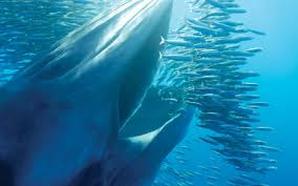Sailfish live a high obtain life.
旗魚的生活很費能量。
To survive, they must find prey daily
為了生存,它們必須每天尋找獵物
so their entire existence will be spent on the move.
所以它們終生都在奔波。
Over ninety percent on the living space for life on our planet, is in the oceans.
海洋占據著地球上90%的生存空間。
Home to the biggest animal that exists or has ever existed, the blue whale.
是現存的最大動物,也是史上最大動物的家,藍鯨。
Some weigh nearly two hundred tons, twice the size of the largest dinosaur.
有的重達200噸,體積是最大的恐龍的2倍。
Despite their great size, we still have little idea of where they travel in the vast oceans
撇開體積不論, 我們仍然不知道它在這廣袤的海洋中去哪里旅行,
and none at all of where they go to breed.
也不知道它們去哪里繁殖。

The largest animal on Earth feeds almost exclusively
這地球上最大的動物只有一種主食,
on one of the smallest krill, shrimp-like crustaceans.
一種非常小的甲殼類動物,磷蝦。
They take many tons of water into their ballooning throats in a single gulp, and sieve out what it contains.
它們一口可吃進幾噸的海水,然后再過濾出想要的東西。
Every day, each one swallows some four million krill.
每天一頭藍鯨可以吃進400萬條磷蝦。
Such gargantuan harvests depend on the continuing fertility of the oceans
這樣巨大的食量依賴富饒的海洋的不斷提供。
But global changes now threaten the great blooms of plankton on which the whales depend.
但是全球環境的變化讓藍鯨賴以生存的浮游生物急劇減少。
Once and not so long ago, three hundred thousand blue whales roamed the oceans
曾經在不久以前,30萬頭藍鯨讓海洋看上去充滿生氣,
now, less than three percent of that number remains.
現在只有不足9000頭。
Our planet is still full of wonders.
我們的星球仍然充滿驚奇。
As we explore them, so we gain not only understanding, but power.
當我們探索奇跡的時候,我們所謀取的不僅僅是去了解它,而是征服。
It's not just the future of the whale that today lies in our hands
掌握在我們手里不僅僅是鯨的命運和未來。
it's the survival of the natural world in all parts of the living planet.
還有這個生命星球上所有生命的存亡。
We can now destroy, or we can cherish. The choice is ours.
要么滅絕它們,要么關愛它們。這取決于人類自己。











